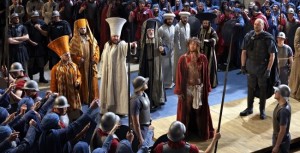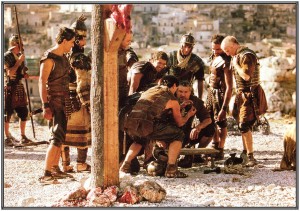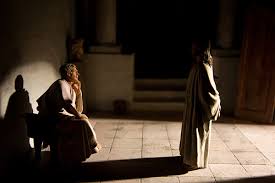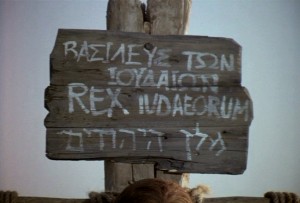36. Pharisee Fever

Now the chief priests and the whole Council kept trying to obtain testimony against Jesus to put Him to death, and they were not finding any. For many were giving false testimony against Him, but their testimony was not consistent. Some stood up and began to give false testimony against Him, saying, “We heard Him say, ‘I will destroy this temple made with hands, and in three days I will build another made without hands.’” Not even in this respect was their testimony consistent. (Mark 14:55-59)
The Greek word for trying to obtain is very intentional and very deliberate (one of its translations). It is a mental, emotional, and physical process. You are trying to reason it out or meditate upon it; but you are also striving after it and craving it. The pursuit and maintenance of untruth requires total commitment on your part. Heart, soul, mind and strength. Sound familiar?
Do you remember the passage from the Sermon on the Mount? Ask, and it will be given to you; seek, and you will find; knock, and it will be opened to you. ( Matt 7:7) A more accurate way of representing this passage would be: Ask (and keep asking) and it will be given to you; seek (and keep seeking) and you will find; knock (and keep knocking) and it will be opened to you. Note the sense of persistence in this passage. The question arises: Are we as persistent in seeking God’s Truth in our prayers as the Pharisees were seeking untruth?
The Greek word for consistent is where we get the root for an isosceles triangle; or equilateral triangle. And if one of the three angles is off even a fraction of a degree, then it is no longer an isosceles triangle. So it is with the truth. If there is any divergence from it, then it is no longer truth but a lie.
In the Greek, the meaning of the word has to do with being the same or equal, measure for measure. It has to do with equal shares, equal rights and fair measures. It is a sad thing to note that the Pharisees had the law and the prophets in their possession; but the truth and guidance found therein did not possess them..
I call this the Pharisee Fever. They had God in the flesh before them, they had Truth Incarnate standing there. He had proven Himself by authority, through miracles and teaching; yet they still would not accept Him as Messiah.
Now, when confronted with the Truth, you either accept it or deny it. But denying it requires that you disassemble it. You cannot ignore it; for if Truth remains it will be revealed, it will be found, and at some point, it will cause you to stumble and your house of cards to fall.
The need to destroy the Truth becomes so great, that eventually it doesn’t matter if what you proclaim has no consistency or credibility. You simply declare your version is consistent, credible, and worthy of placing your trust in it. And that’s what you do—you put your trust in it. And it doesn’t really matter how many civil, social or spiritual commands you break:
You shall not bear false witness against your neighbor. (Exodus 20:16)
You shall not make for yourself an idol, or any likeness of what is in heaven above or on the earth beneath or in the water under the earth. (Exodus 20:4)
You shall not steal, nor deal falsely, nor lie to one another. You shall not swear falsely by My name, so as to profane the name of your God; I am the LORD. (Leviticus 19:11-12)
There are more, but you get the point. The members of the Sanhedrin knew these laws but to keep them would have meant giving up their truth.
Here then is the first phase of the Pharisee Fever: your truth receives its validation and authority from you. You declare it to be meaningful and trustworthy. And you declare it long enough and loud enough until any inconsistencies are seen as irrelevant.
True Truth, absolute truth, has no need for validation. It simply is. That’s how God designed it. It’s worth, veracity, and application is not determined by human perspective, nor by individual interpretation, but by divine decree. It is utterly consistent and will stand up to the most strenuous scrutiny.
The second phase, and indeed the very purpose to the Pharisee Fever, is to destroy the Truth so that manufactured truth can stand unchallenged. Manufactured truth cannot stand when seen in the light of absolute Truth. The Pharisees were not about to trade in their cushy religious jobs and their seemingly exalted positions for a relationship with The Most High.
The reason for the existence of manufactured truth: pride.
The power behind these acts of pride is organized religion (I use that term in the broadest sense). When people choose to ascribe to the same opinions, beliefs, philosophies, and untruths, then build rituals and traditions around them, a unifying and destructive power begins to grow. And those who have gathered beneath its shadow, with the truths they believe, the pronouncements they make; and the actions they take, risk perilous and eternal consequences. Note the actions in Psalm 2.
Why are the nations in an uproar and the peoples devising a vain thing? The kings of the earth take their stand and the rulers take counsel together against the LORD and against His Anointed, saying, “Let us tear their fetters apart and cast away their cords from us!” He who sits in the heavens laughs, the Lord scoffs at them. Then He will speak to them in His anger and terrify them in His fury, saying, “But as for Me, I have installed My King upon Zion, My holy mountain.” “I will surely tell of the decree of the LORD: He said to Me, ‘You are My Son, today I have begotten You. Ask of Me, and I will surely give the nations as Your inheritance, and the very ends of the earth as Your possession. You shall break them with a rod of iron, You shall shatter them like earthenware.’” Now therefore, O kings, show discernment; take warning, O judges of the earth. Worship the LORD with reverence and rejoice with trembling. Do homage to the Son, that He not become angry, and you perish in the way, for His wrath may soon be kindled. How blessed are all who take refuge in Him! (Psalm 2:1-12)
Note how the LORD addresses these kings. He lays down the consequences for their actions: break them with a rod of iron… shatter them like earthenware. But He also gives them the opportunity to repent: show discernment, take warning, worship and do homage. He is revealing to them the path of repentance, and the opportunity to turn from rebellion to refuge. But how can they know this, these pagan kings, who have neither the commands of God nor Word of God. Recall the passage Paul’s letter to the Romans: For since the creation of the world His invisible attributes, His eternal power and divine nature, have been clearly seen, being understood through what has been made, so that they are without excuse. (Romans 1:20)
God has shown enough of Himself for all to know that HE IS. Knowing that, it is then our responsibility and journey to leave the path of rebellion and travel the path of refuge, that we might find salvation.
If there is hope for a pagan king to repent, is there hope for the Pharisee? Can you be healed from the Pharisee fever?
Father, help me to seek You, and to seek Your Truth with at least the same total and utter commitment as one who would seek and maintain untruth. Amen.
 43. Wine & Myrrh
43. Wine & Myrrh
 Christ redeemed us from the curse of the Law, having become a curse for us—for it is written, “Cursed is everyone who hangs on a tree”— in order that in Christ Jesus the blessing of Abraham might come to the Gentiles, so that we would receive the promise of the Spirit through faith. (Gal 3:13-14)
Christ redeemed us from the curse of the Law, having become a curse for us—for it is written, “Cursed is everyone who hangs on a tree”— in order that in Christ Jesus the blessing of Abraham might come to the Gentiles, so that we would receive the promise of the Spirit through faith. (Gal 3:13-14)
 Jesus answered,
Jesus answered, 
 Jesus answered,
Jesus answered, 

 Then they led Jesus from Caiaphas into the Praetorium, and it was early; and they themselves did not enter into the Praetorium so that they would not be defiled, but might eat the Passover. (John 18:28)
Then they led Jesus from Caiaphas into the Praetorium, and it was early; and they themselves did not enter into the Praetorium so that they would not be defiled, but might eat the Passover. (John 18:28)
